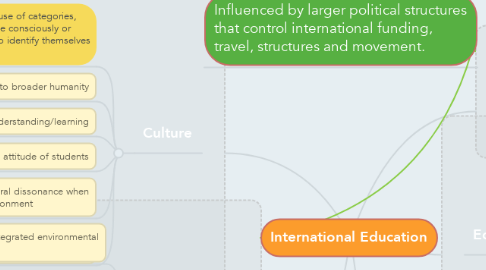International Education
by Eman Helal


1. Culture
1.1. Culture refers to "widely shared ideals, values, formation and use of categories, assumptions about life and goal-directed activities that become consciously or sub-consciously accepted as 'right' and 'correct' by people who identify themselves as members of a society" (qtd. in Allan, 2002).
1.2. Diversity allows insight into broader humanity
1.3. Promote intercultural understanding/learning
1.4. Affect the behaviour and attitude of students
1.5. The emergence of cultural dissonance when exposed to a new environment
1.6. Achieving intercultural competence and cross-cultural communication
2. Curriculum
2.1. Create an integrated environmental curriculum
2.2. Promote life-long learners
2.3. The dilemma of standardized examination
2.4. Rote memory vs. higher order thinking (critical, and creative thinking)
2.5. Teaching life-skills
2.6. Focused on developments in technology and communications
2.7. Curriculum is complex as it attempts to focus attention and effort on what is essential (uncluttering the curriculum)
2.8. Diversity versus Conformity
2.9. Personalizing versus Standardizing
3. Influenced by larger political structures that control international funding, travel, structures and movement.
4. Economics
4.1. Students/Parents
4.1.1. Seek a competitive edge in a globalized market
4.1.2. Increase opportunities for global employment/recognition
4.2. School Board
4.2.1. Focus on attracting international students as a form of profit
4.2.2. National recruitment of teachers or shortage of jobs for teachers hence seeking opportunities elsewhere
